The weird history of Olympic football: Featuring Thierry Henry, protesting sailors and a very angry Hitler
France have an all-star boss targeting gold in Paris – if the past 128 years are anything to go by, he’ll have to navigate some bizarre events to succeed
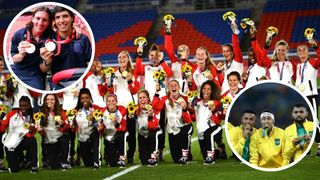
Great Britain may not have a football team at the 2024 Olympics, but three British bosses will be there – as well as some little-known bloke called Thierry Henry.
Installed as the manager of France’s under 21s last year, Henry is also boss of their Olympic team – given that they’re hosting the Games and are heavy favourites to win gold, no pressure, Titi…
Alexandre Lacazette, Jean-Philippe Mateta and Michael Olise are all selected for the 18-man squad. France’s first game is against the USA on the opening day of the football tournament, at Marseille’s Stade Velodrome on July 24 – the final is at the Parc des Princes in Paris on August 9.
Brazil failed to qualify for the men’s tournament, despite winning gold at the last two Olympics, but the group stage does offer up clashes of the titans like the Dominican Republic vs Uzbekistan, Mali vs Israel and Iraq vs Ukraine, while Guinea take on a New Zealand side managed by former Watford defender Darren Bazeley. Javier Mascherano is in charge of Argentina.
VIDEO: Ranking Every England Player At Euro 2024
Favourites for the women’s gold are the USA, led by Emma Hayes, who departed Chelsea two months ago to move Stateside on a contract that runs until the 2027 World Cup. She’ll attempt to wrestle the Olympic prize off fellow Englishwoman Bev Priestman, who guided Canada to gold in Tokyo.
France’s female hopes rest with Herve Renard, mastermind of Saudi Arabia’s shock win over Argentina at the men’s World Cup in 2022, but England’s poor results in the Nations League mean Great Britain haven’t qualified, unlike in Tokyo. It’s the latest chapter in GB’s in-out relationship with Olympic football, a competition that was weird from the start…
Get the FourFourTwo Newsletter
The best features, fun and footballing quizzes, straight to your inbox every week.
The weird history of Olympic football: The match that never existed
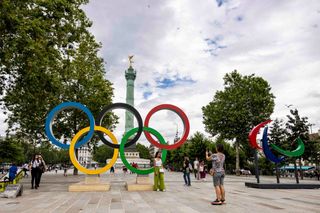
Football wasn’t officially part of the first Olympics in 1896, after several of the invited teams didn’t turn up. A match did take place, but bizarrely it was forbidden to be reported, with Greek Crown Prince Constantine keen to keep all unofficial sports out of the media.
Just as well: details that emerged were sketchy, but Denmark reportedly walloped Greece either 9-0 or 15-0, in a fixture refereed by Constantine’s younger brother, prince of both Greece and Denmark.
Greece took another 31 years to get their act together and tighten up their defence, presumably involving root-and-branch review and the immediate building of a 1900s St George’s Park (in those days, just a field). By the time they played their first official FIFA fixture in 1927, they only lost 4-1 to Italy. Much better.
Upton Park: Gold Medallists
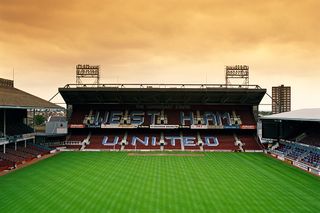
The Greece and Denmark sides of 1896 were largely made up of players from individual clubs – when the Olympics’ first official football tournament took place four years later, Great Britain were represented by Upton Park FC.
Involved in the inaugural FA Cup in 1971, the club ended up in the Southern Alliance rather than the new Football League, then accepted the invite to represent GB in Paris – they only went and won the thing, beating Club Francais in their only fixture to bag gold.
The Free University of Brussels were the other side involved, but the bronze medallists were registered as a ‘Mixed Team’ rather than Belgium, because their line-up included a Brit and a Dutchman.
"Beware, 17-1 is a dangerous lead"
The early Olympics weren’t always entirely competitive – in 1908, Great Britain hammered Sweden 12-1 at London’s White City, while Denmark thrashed France 17-1, thanks to 10 goals from Sophus Nielsen.
GB beat Denmark in the final (a rather more sensible scoreline of 2-0), then bagged their third gold in four Olympics by triumphing again in 1912. Germany beat Russia 16-0 at that Games, with Gottfried Fuchs also netting 10.
Football had almost been removed from the 1912 Games, with hosts Sweden concerned that the sport’s ‘popularity was not yet worldwide’. Give it a few years, guys…
Czechoslovakia: No fans of John Lewis
Teams were certainly taking it seriously in 1920, after World War One escalated tensions – Germany, Austria, Hungary, Bulgaria and Turkey were all uninvited, then Belgium faced Czechoslovakia in the final.
The former led 2-0 in front of a huge crowd in Antwerp, when the Czechs walked off before half-time, protesting English ref John Lewis, and presumably his Christmas ads, too.
The match was abandoned and Czechoslovakia were refused a medal – Spain got silver instead.
How about a World Cup?
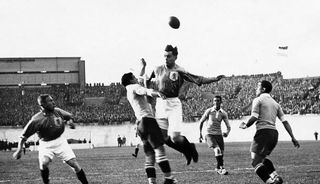
By 1928, the tournament had expanded so much that FIFA sensed an opportunity.
Four years earlier, Uruguay had become the first South Americans to enter – travelling to France on third-class boat tickets, then winning gold, mainly because none of the European teams knew who the hell their players were. They were pretty handy, as it turned out.
Uruguay beat Argentina to win 1928 gold, too – Chile, USA, Mexico and Egypt also took part, giving the tournament a new global feel, even if Egypt lost 11-3 to Italy in the bronze medal match.
Great Britain didn’t take part in 1924 or 1928, steadfast in their belief that only amateur players should be selected – they’d lost to Norway in 1920 before withdrawing, as other countries began to pick professionals.
By 1928, football was the most popular event at the Games, with more than 250,000 ticket requests. A day before the tournament started in Amsterdam, Jules Rimet presided over a FIFA congress in the city, which voted that a World Cup would launch in 1930. A wrangle between FIFA and the International Olympic Committee ensued, meaning football was dropped from the 1932 Games, but it returned in 1936, for only amateurs and state-sponsored players.
Hitler's not happy
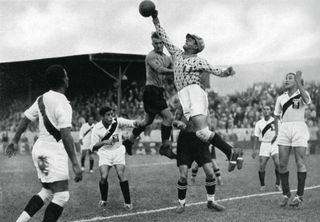
It wasn’t only Great Britain that Norway managed to irk – the Scandinavians annoyed Adolf Hitler, too.
The 1936 Olympics were infamously held in Berlin during the Third Reich: Great Britain returned but lost to Poland in the quarter-finals, where hosts Germany also fell. Hitler had turned up to watch his first ever football match, planning it as a propaganda opportunity, demonstrating Germany’s power to the world – that went a bit wrong when Norway made it 2-0 with seven minutes left, and the red-faced dictator flounced out of the stadium. “The Fuhrer,” is incensed, Joseph Goebbels revealed. At least he didn’t throw his season ticket at the manager on the way out.
Hitler never went to another match for the rest of his life – a day later though, there were odd goings-on when allies Austria trailed Peru 4-2, only for a pitch invasion in the final minute of extra-time. An Austrian player went down injured and the game was abandoned – other reports suggested that the referee had suddenly noticed that the pitch was the wrong size.
A replay was ordered, but Peru took their entire Olympic team home in protest – back in Lima, locals tore down the Olympic flag and threw stones at the German consulate.
Dulwich Hamlet: Olympic venue?!

No fewer than 11 grounds were chosen to stage fixtures at the 1948 London Olympics – Wembley obviously got the final, but the tournament started with Luxembourg leathering Afghanistan 6-0 at Brighton’s Goldstone Ground, before France beat India at Ilford FC, Turkey defeated China in Walthamstow and South Korea overcame Mexico at Dulwich Hamlet’s Champion Hill.
Great Britain fielded a ragtag team from clubs as disparate as Queen’s Park and Barnet, managed by 39-year-old Manchester United boss Matt Busby. He may have been great, but he wasn’t yet a miracle worker – GB lost the semi to Yugoslavia, then the bronze medal match to Denmark.
"No-one tell Stalin the result..."
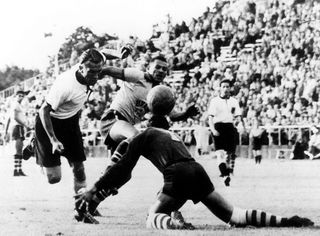
Sweden bagged gold in 1948, but the next eight Olympics were won by the Eastern Bloc – state funding ensured their teams were superior to other countries’ amateur players.
Hungary wheeled out Ferenc Puskas for victory in 1952 – FA secretary Stanley Rous was so impressed he invited them for a friendly at Wembley the following year, possibly regretting that when the Magyars famously humiliated England 6-3.
The USSR also had high hopes at those Games in Helsinki, but faced Yugoslavia in a first-round grudge match – Joseph Stalin had fallen out with Yugoslavia’s fellow Communist leader Josip Broz Tito, and even tried to get him assassinated. USSR came from 5-1 down to draw 5-5, but lost the replay – the result wasn’t mentioned at all in the Soviet press until Stalin’s death a year later.
It didn’t end there, either: CDSA Moscow, who’d provided most of the players, were expelled from the Soviet league then disbanded, despite being champions in each of the previous five seasons. Some suggested that was opportunism to benefit KGB chief Lavrentiy Beria, honorary president of rivals Dinamo Moscow. Who won the league for the next two years? Er, Spartak...
Sailors' mutiny
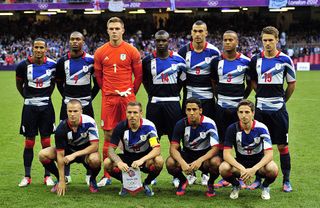
Great Britain exited 5-3 to Luxembourg in the preliminary round in 1952 – four years later, a defeat to Bulgaria was too much for some GB-supporting sailors.
Trailing 3-1 at half-time in Melbourne, 80 mariners from the visiting HMS Newcastle vaulted the pitchside fence and staged a protest march in a bid to inspire a fightback, wielding an umbrella in English colours and a sign saying ‘Up The Lions’. Stirring stuff – police escorted them out of the ground, and Bulgaria won 6-1.
GB appeared at the Olympics just once more, in 1960, failing to qualify for the next three Games, then withdrawing until 2012.
The rise of East Germany
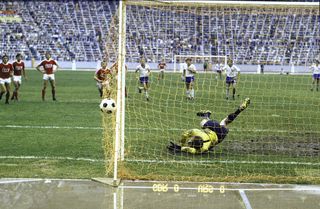
East Germany only qualified for one World Cup, but they were Olympic champions in 1976.
Twelve years earlier, they’d claimed bronze as the United Team of Germany – East had beaten West in a play-off to determine which side would progress to the Games under that name.
Bronze was theirs again in Munich in 1972, beating West Germany in the group stage, then drawing with the USSR in the third-place match, meaning the medal was shared – the Soviet team doctor later claimed the game was fixed.
In the 1976 battle of the Communist states, North Korean An Gil-wan was banned for attacking the referee not once but three times during defeat to the Soviets, before East Germany beat Poland in the final – the only time any German side has ever won the men’s tournament.
Seek professional help
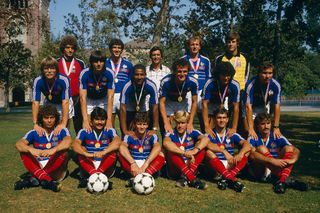
After gold for Hungary, the USSR, Yugoslavia, Hungary, Hungary, Poland, East Germany and Czechoslovakia, the east’s dominance finally ended in 1984 – thanks to a rule change, then a boycott.
Professionals were allowed to take part, as long as they hadn’t played in a World Cup, before an under 23s rule was also introduced in 1992.
When the USSR, East Germany and Czechoslovakia boycotted the 1984 Games in Los Angeles, amid Cold War tensions, it left the way clear for France to win gold, beating a Brazil side containing a young Dunga at the Rose Bowl, in front of 101,799. A decade later, Dunga would be back at the same stadium, lifting the World Cup.
The wrong Athens
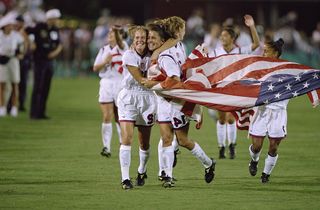
Fully 100 years after the first Olympics, the inaugural women’s football tournament took place in 1996 – fittingly, the final was in Athens… Athens, Georgia, that is.
Seventy miles from Atlanta, possibly as a result of some sort of terrible mix-up, like the Belgium fans who accidentally ended up in the Yorkshire village of Wales before a key fixture against the country of the same name in 2015, the small city of Athens was the venue as the USA beat China on home soil. They’d win four of the first five female Olympic tournaments, triumphing in Athens again in 2004 (the proper one, in Greece), before further golds in Beijing and London.
"Mo Salah? Not interested"
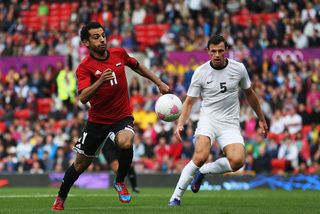
Less than 9,000 turned up to see Mo Salah play in a 50,000-capacity stadium at the 2012 Olympics – mainly because hardly anyone had heard of him back then.
The 20-year-old was yet to make his Basel debut, having just moved from Al Mokawloon, when he netted against Belarus at Hampden Park, following previous goals against Brazil and New Zealand.
It was the lowest attendance in either the male or female tournaments – the highest was the 86,000 that saw Neymar’s Brazil improbably lose to Mexico in the men’s final.
A Spain team containing Juan Mata and Jordi Alba somehow managed not to score a single goal to finish bottom of a group containing Japan, Honduras and Morocco – Luis Suarez and Edinson Cavani couldn’t get on the scoresheet for Uruguay either, as they went out in a group won by Stuart Pearce’s Great Britain, who lost to South Korea in the quarter-finals, on their first Olympic return since 1960. If only they’d picked David Beckham…
GB women went out to John Herdman’s Canada at the same stage, in a women’s tournament that featured an unfortunate gaffe, when the South Korean flag was accidentally used for North Korea’s game with Colombia. Luckily that didn’t upset them at all, and they absolutely didn’t protest so furiously that kick-off had to be delayed by an hour. Hang on, they did.
Olympic football, always on the verge of some sort of international incident – never change…

Thank you for reading 5 articles this month* Join now for unlimited access
Enjoy your first month for just £1 / $1 / €1
*Read 5 free articles per month without a subscription

Join now for unlimited access
Try first month for just £1 / $1 / €1

Chris joined FourFourTwo in 2015 and has reported from 20 countries, in places as varied as Jerusalem and the Arctic Circle. He's interviewed Pele, Zlatan and Santa Claus (it's a long story), as well as covering the World Cup, Euro 2020 and the Clasico. He previously spent 10 years as a newspaper journalist, and completed the 92 in 2017.